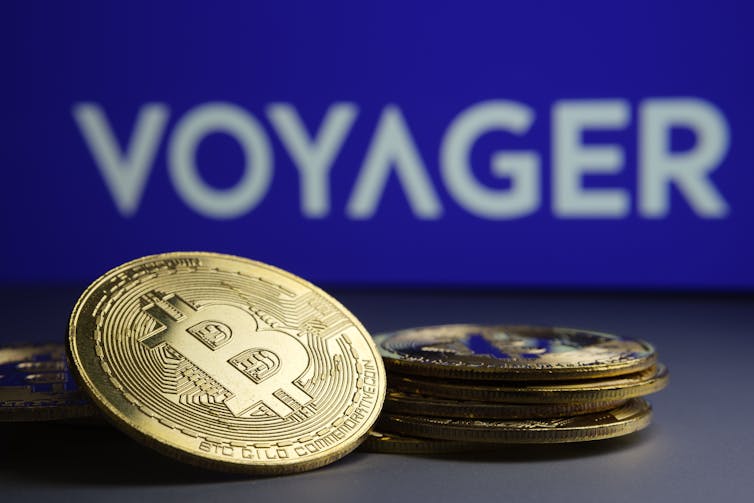There is a well-known saying shared by crypto experts and skeptics alike: “Not your keys, not your coins.” The term, popularized by Bitcoin founder Andreas Antonopoulos, refers to how the contents of a crypto wallet are the property of whoever has access to the wallet’s digital “keys.”
This means that unless you personally hold the keys to your crypto assets and store them offline, you are vulnerable to hacks, fraud and bankruptcies. The endless stream of crypto scams is well documented. So have the security breaches – and not to mention the conspicuous carbon emissions.
Read more: The digital economy’s environmental footprint threatens the planet
Of course, offline storage requires an additional level of understanding, technological sophistication and inconvenience. Enter crypto exchanges like Coinbase and Crypto.com, which offer simple, convenient platforms for users to buy and sell cryptocurrencies and NFTs.
However, the crypto crash has revealed that these firms are not just exchanges – they are more like banks. Apart from defunct crypto exchanges like Celsius Network and Voyager Digital were just banks if you read the fine print. Of course, most customers didn’t.

(Shutterstock)
Who needs deposit insurance?
Until very recently, crypto exchanges were at their peak. They had A-list celebrities, naming rights to the stadium and public endorsements from major politicians.
Crypto exchange companies market themselves as platforms for users to buy and sell crypto. But they also act as stockbrokers, and more worryingly, their core business models are quite similar to banking.
Traditional exchanges, such as the New York Stock Exchange, rarely go bankrupt. And since they don’t offer account services, their clients aren’t on the hook for losses if they go bankrupt. Brokerage firms, such as Wealthsimple, sometimes go bankrupt, but clients’ portfolios are held in the client’s own name and can therefore simply be transferred to another broker. In the event of fraud, both Canada and the United States provide automatic insurance for lost assets.
Banks, such as the Royal Bank of Canada, take on more risk and fail more often. Because banks use customer deposits to make loans, banks are vulnerable to runs. This is why most high-income countries – including Canada – have deposit insurance and regulate banking more than other financial services.
Herein lies the problem. Companies like Celsius and Voyager marketed themselves as both exchanges and brokers, so that’s how their apps emerged. But if anyone were to read the terms, it would be clear that they were in fact uninsured, quasi-banks.
Risks in crypto banking
In companies like Celsius and Voyager, customers’ accounts were not held separately in their own wallets, but rather held in a pool owned by the platform. The platform would use this money to make loans (often to other crypto firms) or to engage in its own speculative investments (often in crypto assets). When depositors withdrew, they were paid from the pool, which could cover regular withdrawals on demand but did not have enough cash to handle all withdrawals at the same time.
Sounds familiar?

(Shutterstock)
As crypto prices collapsed, these firms’ loans went up and some were forced to suspend withdrawals. When Celsius filed for Chapter 11 bankruptcy, their depositors learned their accounts were worthless after being drained by the company.
These firms deliberately hid this reality from their customers. In Voyager’s case, they simply lied about being FDIC insured. Snake-oil sellers from these companies convinced their customers that regulated banks were the problemjust to find out exactly why these regulations exist in the first place.
To make matters worse, the lack of transparency in crypto markets makes it quite easy for managers and developers to dump their positions long before suspending withdrawals. By the time customers realize their money is gone, those responsible have paid out a tidy profit.
The future of decentralized finance
So where do we go from here?
At the micro level, the answers are obvious. Crypto exchanges should be regulated in the same way as brokers. Customer funds must be kept separate and secure, with clear rules on risk exposure in the companies’ proprietary trading.
The crypto-assets themselves should be clearly labeled as securities, and are therefore subject to supervision. Exchange platforms should be required to have sufficient cash in state-issued currency. If this sounds like it violates the ethos of decentralized finance, that’s because it should.
The macro level is more difficult. After 2008, we have demonized the big banks and fetishized technology. Crypto enthusiasts argue that Wall Street is only in it for themselves, and they’re right. But they have recreated the same system, only it is even more risky.
The late arrivals to the crypto party – those now holding the bag – are not the wealthy investment class. They are ordinary people, rightly distrustful of the banks and by extension our institutions, and they are desperately looking for ways to protect themselves from skyrocketing inflation.
Rebuilding this trust takes time and energy. It requires a willingness to deal with the inequalities caused by rising living costs and a recovering financial system. And, crucially, it requires effective regulation. If it looks like a bank and acts like a bank, it must be treated like a bank.

























